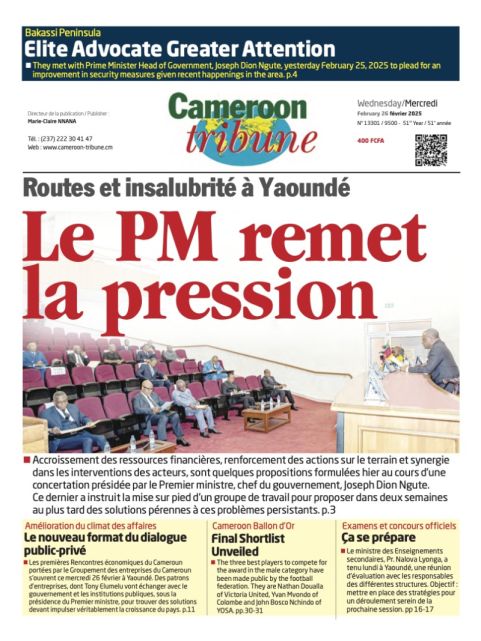CERDOTOLA : Reasserting African Identity
- Par Richard Kometa
- 03 nov. 2022 11:19
- 0 Likes
Academic discourse on African culture tend to be at variance with the reality on the ground. After decades of colonisation, the scars seem to be profoun, with most African countries having serious difficulties cutting off from their colonial past. Food, dressing, language, housing, health care, and so on have been greatly affected by foreign models, thereby giving the impression that Africa had little or nothing of her own left.
While in certain countries, their culture is so entrenched in everyday life that they do not require the creation of ministries to promote it, African countries have generally shown cosmetic service to the promotion of cultural values through the putting in place of ministries in charge of culture, perhaps for political convenience. Language is one of the basic elements of culture that requires valorisation if a people want to remain relevant. Unfortunately, most African countries have been unable to strike a balance between promoting their indigenous languages and those they inherited from their colonial masters. In some cases, such unfortunate inheritance has been a source of serious conflicts as in Cameroon, Nigeria etc.
The protection of values that are authentically African came to the fore again in Yaounde from 25-28 October, 2022 during the conference by the International Centre for Research And Documentation on African Traditions and Languages (CERDOTOLA). Getting the highest political blessings in Cameroon as the organisers, headed by Professor Charles Binam Bikoi, did through the endorsement of the Head of State who was represented at the conference by Prime Minister, Head of Government, Joseph Dion Ngute, was in itself comforting. Having as theme, “A Convention for a New African Thought” sounded a bell of reawakening. It came as reminder that decades on, Africa is still reeling under the shackles of estrange influences which are disadvantageous to the wellbeing of the entire continent. It is common knowledge that Africa requires decades to undo the damage slavery and colonisation caused to the continent. Still, with so much grey matter on the continent and beyond. Economic, social, and political evolution in Africa has been largely conditioned by foreign factors, in some cases leaving the people completely disenchanted. Although nearly every community across the globe has suffered one form of oppression or the other, it is evident that most of those who succeeded in holding onto their values either clung to their culture or simply developed an indigenous language that today serves as their unique identity. Some are even using such a trade mark to conquer further territory including Africa which has already witnessed much gruesome domination in the past. To allow a repeat of any such dominance again, no matter how subtle, could be disastrous. Alas! it is uncertain if there is enough critical mass in Africa to stand up and defend what is purely theirs.
Initiatives like the CERDOTOLA International Conference 2022 are, to say the least, the best way to go, especially if they were to gain full acquiescence. It would however be unaccepted naivety to imagine any quick consensus around the issues at this time and age of the so called globalisation. Sieving the grains from the weed in terms of defending purely African values can no longer be a backyard picnic today. Forces against such moves (because of others wanting to protect their interests to the disadvantage of Africa) are so many and varied. The language that most people in Africa speak, the clothing they put on, the housing pattern, even the meals, are generally adulterated to the extent that some segments of the African population are made to under estimate what is unique to their culture.
Ahead of the CERDOTOLA conference, organisers pointed out that; “In less than a decade, without transition and almost by decree, we have moved from the long image disease of the “hopeless continent” and the “shackled continent” to an anomaly of thought that comes under the tropisms of “Africa rising”, “emerging Africa” and the likes, whose treatment is to say the least, ‘lacunary’ in Africa and Africanist thought.” African researchers should be eager to know where the continent has gone wrong for centuries to the extent of remaining behind at all levels and only...
Cet article complet est réservé aux abonnés
Déjà abonné ? Identifiez-vous >
Accédez en illimité à Cameroon Tribune Digital à partir de 26250 FCFA
Je M'abonne1 minute suffit pour vous abonner à Cameroon Tribune Digital !
- Votre numéro spécial cameroon-tribune en version numérique
- Des encarts
- Des appels d'offres exclusives
- D'avant-première (accès 24h avant la publication)
- Des éditions consultables sur tous supports (smartphone, tablettes, PC)











Commentaires